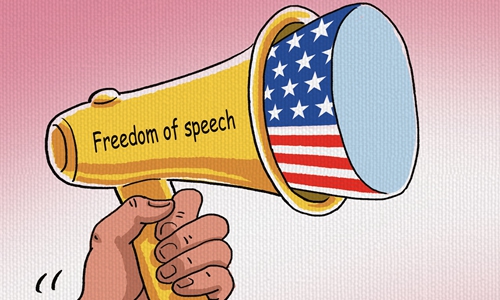Case shows the US most guilty of impeding freedom of speech
Source:Global Times Published: 2020/4/28 21:38:40

Illustration: Liu Rui/GT
The US has had nearly 1 million confirmed cases of COVID-19 with more than 56,000 novel coronavirus-related deaths, according to Johns Hopkins University figures. Once again, the skyrocketing coronavirus data shows the inability of the US government to handle th[pe crisis. Meanwhile, the US has disclosed how hypocritical it can be in a lawsuit filed by the family of a 16-year-old teen, who was a victim of the US cyber censorship.Amyiah Cohoon, 16, was asked by a local sheriff to remove three Instagram posts about what she believed was her experience with COVID-19 because it upset some parents at her school, otherwise she would risk violating rules on disorderly conduct and be cited or arrested, the New York Times reported on April 21 citing the family's lawsuit. The Cohoons sued the sheriff and his sergeant, accusing them of violating Amyiah's right to free speech.
The fact is that the US leads the world in terms of censoring people's speech, especially in this extremely sensitive period of the COVID-19 pandemic. Therefore, even though a teen posted nothing but facts on social media networks, nor she blamed the government for her sufferings, she was condemned for using "a foolish means to get attention" and making "nonsense."
Having an officer show up at the door is uncommon in the US. The sergeant's visit shows how nervous US society has become in the face of the pandemic. But Americans are driven to panic as their leaders are busy focusing on the approaching elections rather than on flattening the curve of hospitalizations.
After various social tragedies, there are more and more redlines encircling Americans' so-called freedom of speech. If any redline is crossed or believed to be crossed by a person, he or she will have to pay a price - from taking back what they said to having their SNS accounts blocked or suspended, and to doing time. Americans think they are living in a free country, but they are under de facto surveillance without their knowledge of it.
The teen's story reflects what millions of ordinary Americans are undergoing: Amyiah can't get tested even though she had symptoms consistent with COVID-19 as she didn't meet the criteria; she was then mistreated for telling facts. What about the rest of the vast vulnerable groups?
Competitions between the two political parties and between the federal and state governments are turning white-hot in the US. Such being the case, any move that threatens, or just allegedly threatens, the authorities will be kept a close eye on and put under a magnifying glass
A similar story to Amyiah's will probably be repeated someday, but it didn't spark hot debates in the US and the media outlets didn't fully cover it. Are Americans accustomed to similar incidents?
If this were about a Chinese girl, the US media would be enjoying a carnival: They might try their best to contact the family to get some words they can use to maliciously make up stories.
Stigmatizing China is deeply rooted in the paranoia of some US politicians and media outlets, who find fault with China whenever possible. They attack China for its system, ideology, governance, and even goodwill in helping other countries and regions overcome the current crisis.
Those politicians condemn China for its strict measures that brought the coronavirus under control and for its so-called violation of freedom of speech. But they have turned a blind eye to their very own violation of people's basic human rights, showing their double standard on China.
When Wuhan Diary, a critical daily account of Wuhan residents' lives under the lockdown and the author's own reflections on the coronavirus crisis, sparked controversy in China, the US side suggested that China violated freedom of speech by allegedly encouraging online attacks on Fang Fang, the diarist who enjoys total freedom to speak. In the contrast, however, a US teen's three truth-telling posts almost got her arrested. Is this how the US protects the freedom of speech?
The article was compiled by Global Times reporter Xu Hailin based on an interview with Wang Yiwei, a professor at the School of International Relations under the Renmin University of China. opinion@globaltimes.com.cn
Posted in: VIEWPOINT